Social Current’s Knowledge and Insights Center is now offering access to the Next Big Idea Club. This virtual book club, curated by bestselling authors Malcolm Gladwell, Adam Grant, Susan Cain, and Daniel Pink, delivers the most important nonfiction books of the year. Through our online forum, you can dive deep into impactful ideas with 45-minute audio and video lessons. These lessons distill the essence of groundbreaking books, offering you a comprehensive understanding in a fraction of the time.
Social Current’s access includes highlights from the Next Big Idea Club’s collection of books, with a particular emphasis on:
- Workplace relationships
- Workforce resilience
- Improved communication and interpersonal connection
- Authentic approaches to diversity, equity, inclusion, and belonging
In this forum, featuring lessons from the books below, you’ll learn strategies and techniques that improve relationships with coworkers, clients, community members, and partners, in addition to your personal relationships away from work.
- High Conflict: Why We Get Trapped in Conflict and How We Get Out by Amanda Ripley
- Uncensored: My Life and Uncomfortable Conversations at the Intersection of Black and White America by Zachary Wood
- You’re Not Listening: What You’re Missing and Why It Matters by Kate Muphy
- No Hard Feelings: The Secret Power of Embracing Emotions at Work by Liz Fosslien and Mollie West Duffy
Access to the Next Big Idea Club is an exclusive benefit for Social Current Impact Partners.
Learn more about the benefits of becoming an Impact Partner online and by joining an upcoming informational webinar.
How to Access
Go to Next Big Idea Club: Better Relationships In and Out of the Workplace.
Social Current Impact Partners can access these lessons for free by logging into the hub. Log in to your existing account or create one if you are a new user. Once logged in, check out the resources list and click on the individual records to view.
Learn more about the Social Current Knowledge and Insights Center.
At Social Current’s SPARK 2023 conference last October, I announced our New Narrative campaign and shared that Social Current would be collaborating on the social impact campaign for the film UnCharitable. After months of planning and conversations with our UnCharitable colleagues, I am excited to announce that Social Current will be the catalyst, convener, and activator on the social impact campaign for UnCharitable.
While ideas are still taking shape, we are excited that, together with the UnCharitable team, we will be working to solidify funding and identify an initial cohort of communities to create, test, and refine strategies to change the perception and fundamentally redefine the nonprofit sector and its ability to solve social problems.
We will be sharing more details in the coming months and at SPARK 2024 in Denver this October and are excited about the future opportunities for you and your organizations to be part of this important work.
The important work of creating an equitable society where all people can thrive cannot be achieved without the support of diverse community-based partnerships. Global Volunteer Month, celebrated in April, provides a great opportunity to acknowledge and celebrate partners that donate time, resources, and expertise to make a difference in our communities.
Social Current is grateful for its corporate social responsibility partners, which bolster our network’s impact by engaging teams of corporate volunteers and generously donating resources.
Aramark
Social Current is grateful for our 16-year partnership with Aramark. Rooted in service and united by purpose, Aramark strives to do great things for its employees, partners, communities, and planet. Their global volunteer program, Aramark Building Community, engages the talents and passions of employees to develop solutions that address challenges caused by lack of access to healthy food and proper nutrition, financial insecurity, and inequitable environments. The program drives stronger communities, creates employee volunteer opportunities, and encourages employees to give back to their local communities.
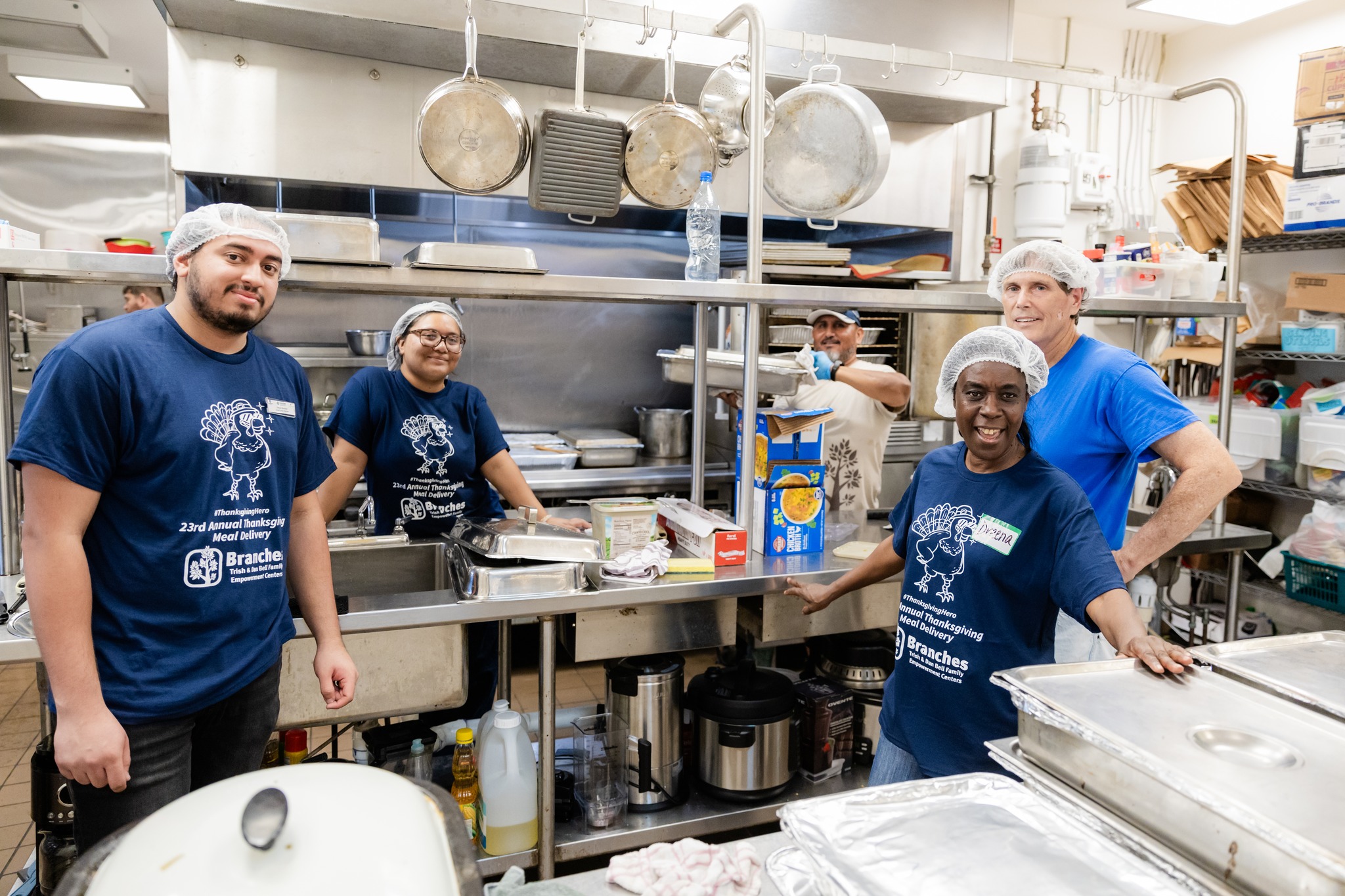 The Aramark Building Community grant program and team of engaged volunteers have been an incredible support for Social Current partner Branches in Miami, especially over the holidays. Aramark volunteers cooked, packaged, and delivered meals over Thanksgiving, while also purchasing and wrapping gifts for college students during the holidays.
The Aramark Building Community grant program and team of engaged volunteers have been an incredible support for Social Current partner Branches in Miami, especially over the holidays. Aramark volunteers cooked, packaged, and delivered meals over Thanksgiving, while also purchasing and wrapping gifts for college students during the holidays.
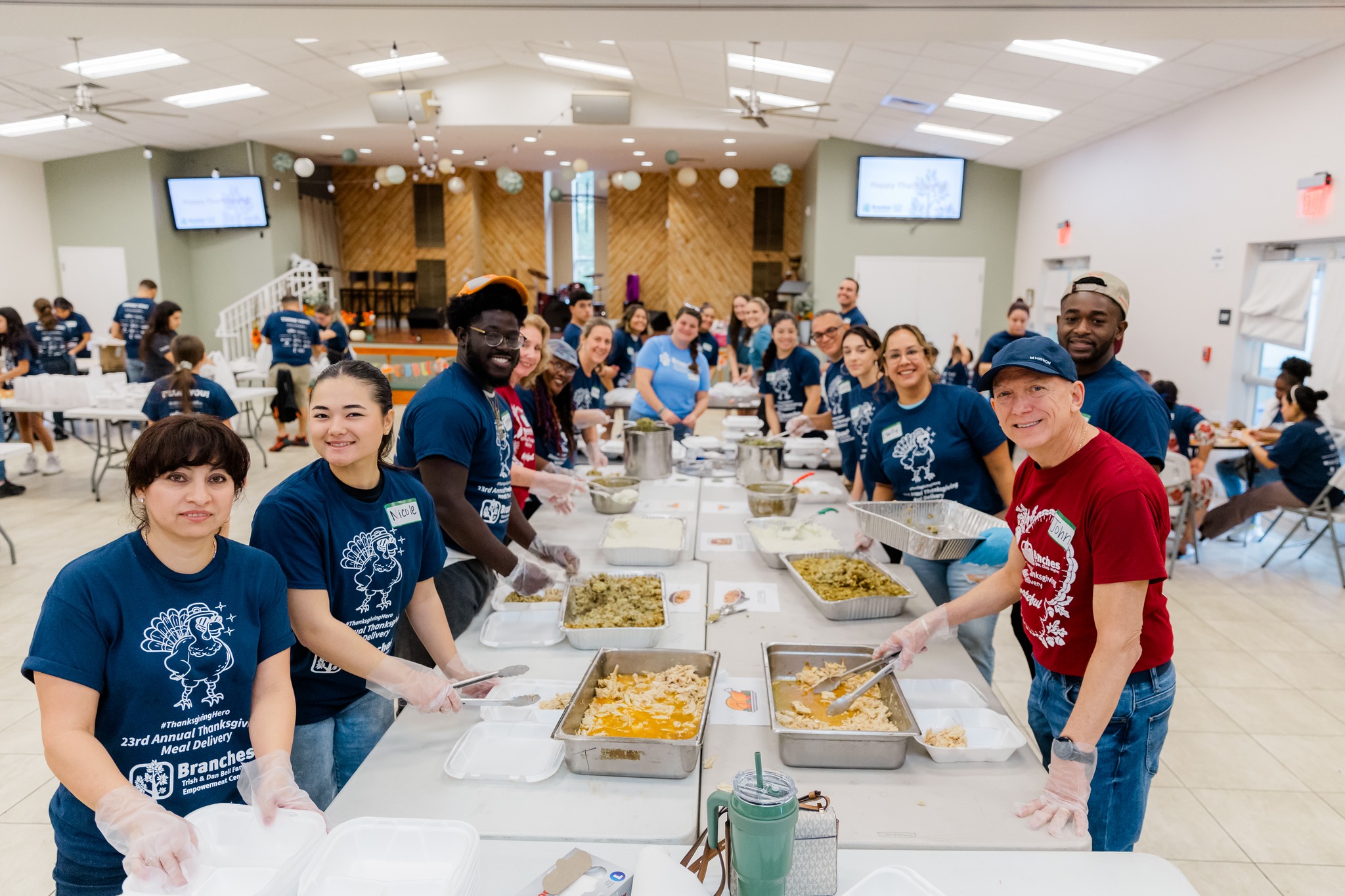 “We are continually grateful for the service-minded spirit of Aramark volunteers,” said Sarah Pattinson, associate director of development at Branches. “They come ready to serve the community and to tackle any project we present them with. They serve with joy and are always willing to go above and beyond for others.”
“We are continually grateful for the service-minded spirit of Aramark volunteers,” said Sarah Pattinson, associate director of development at Branches. “They come ready to serve the community and to tackle any project we present them with. They serve with joy and are always willing to go above and beyond for others.”
CSC ServiceWorks
Since 2021, Social Current has partnered with CSC ServiceWorks, the leading provider of laundry solutions and air vending services throughout the U.S., Canada, and Europe.
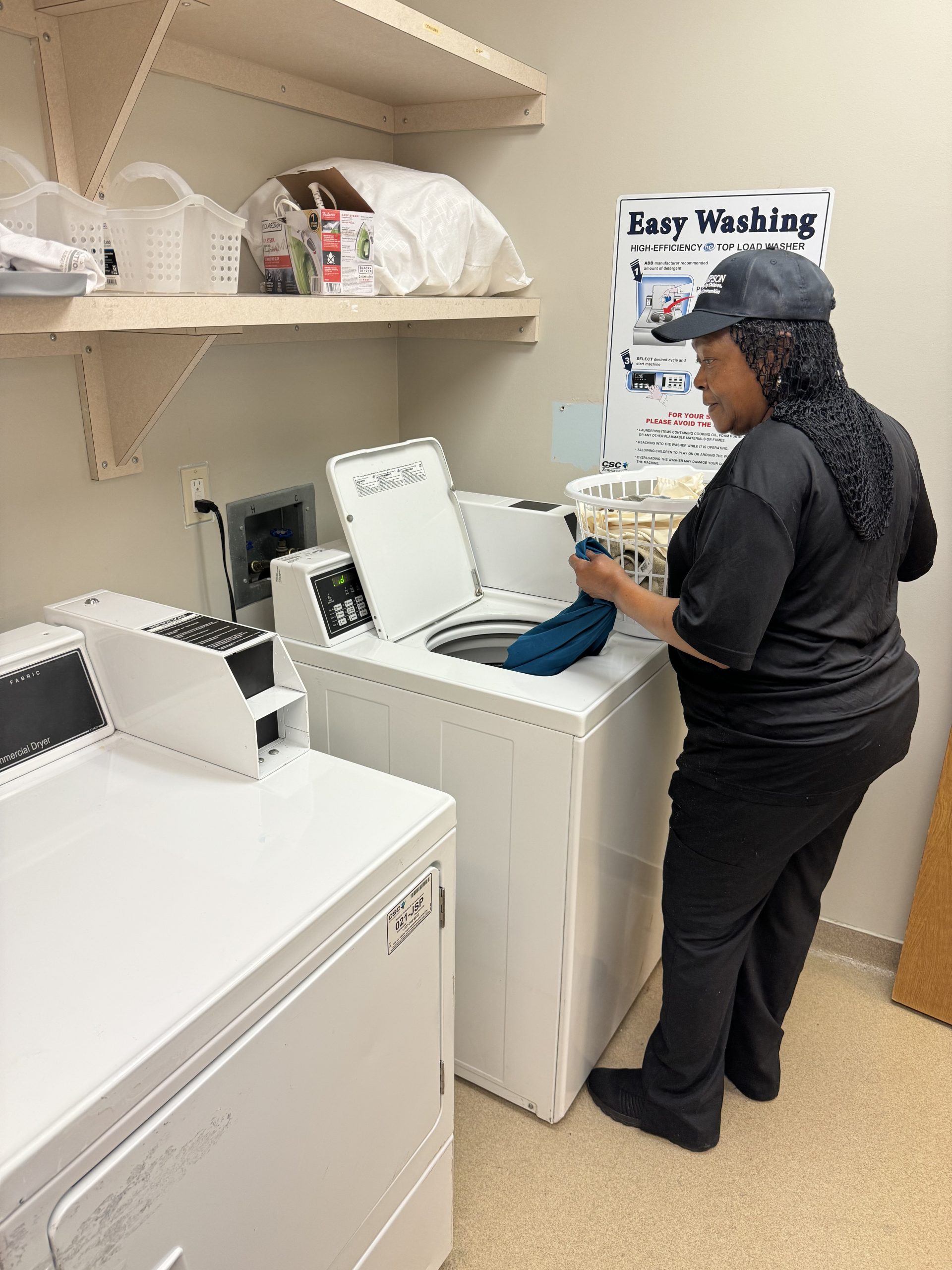 CSC CommunityWorks’ Signature Services program works with community organizations to provide reliable access to clean laundry and basic supports. They believe access to clean laundry is essential to helping people be successful in school and work as well as to maintain healthy lifestyles. CSC teams support their local community-based organizations by providing washer, dryer, air, and vacuum equipment; ongoing service for these machines; and volunteer support. Through their donations of washers, dryers, and ongoing equipment maintenance, CSC helps strengthen the capacity of Social Current partners who are providing essential services.
CSC CommunityWorks’ Signature Services program works with community organizations to provide reliable access to clean laundry and basic supports. They believe access to clean laundry is essential to helping people be successful in school and work as well as to maintain healthy lifestyles. CSC teams support their local community-based organizations by providing washer, dryer, air, and vacuum equipment; ongoing service for these machines; and volunteer support. Through their donations of washers, dryers, and ongoing equipment maintenance, CSC helps strengthen the capacity of Social Current partners who are providing essential services.
“The equipment [provided by CSC ServiceWorks] has allowed us to keep our laundry done in a timely fashion because our machines stay in operation,” said Danny Whitley, chief facilities officer at Thompson Child and Family Focus in Matthews, North Carolina. “We are 24/7 facility, and laundry is crucial to our care.”
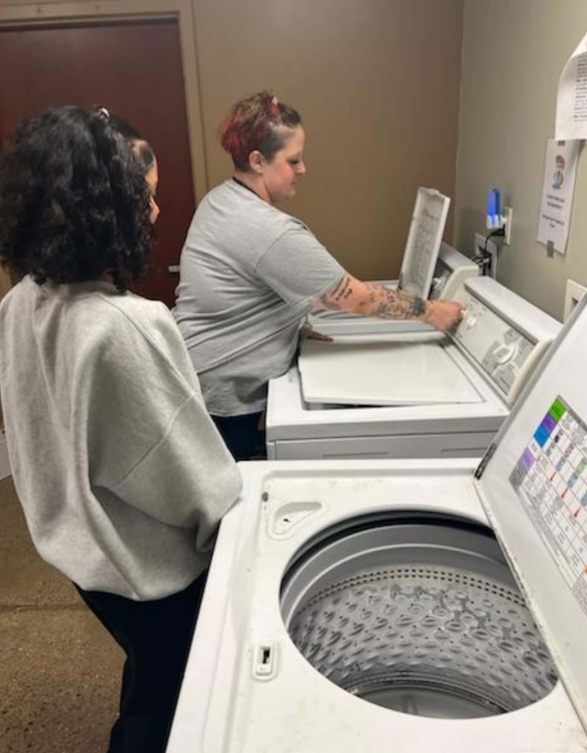 Rodney Prystash, director of facilities/operations at Auberle in McKeesport, Pennsylvania, shared, “The six high-quality washer and dryer units provided by CSC ServiceWorks have really helped meet the need for families residing at our homeless family shelters, and for the young women and men at our semi-independent living programs. The donated equipment and volunteer installations have allowed us to use resources for other critical items for those that we serve.”
Rodney Prystash, director of facilities/operations at Auberle in McKeesport, Pennsylvania, shared, “The six high-quality washer and dryer units provided by CSC ServiceWorks have really helped meet the need for families residing at our homeless family shelters, and for the young women and men at our semi-independent living programs. The donated equipment and volunteer installations have allowed us to use resources for other critical items for those that we serve.”
Social Current celebrates and thanks all of its corporate volunteers, working in partnership with our network of organizations and helping us implement equitable solutions to society’s toughest challenges. For questions about Social Current’s corporate partnerships, please contact Emily Merritt, senior manager of corporate partnerships.
Lauri Goldkind, associate professor at Fordham University, will lead a session on artificial intelligence (AI) in human services at the upcoming CEO Convening, May 1-3 in Detroit. During the session, she’ll help participants assess opportunities and challenges related to using AI in human services organizations. This rapidly developing technology holds promising benefits for greater efficiency and effectiveness; however, it must be implemented strategically. Participants will be introduced to the three main applications of generative AI, learn how to conduct an organizational readiness assessment, and consider the elements of an organizational AI policy.
Goldkind’s research interests include data justice, AI and data ecosystems in nonprofit management, and telemental health and human rights. She has coauthored two articles for Social Current’s journal, Families in Society: The Journal of Contemporary Social Services. The journal offers peer-reviewed content that continually advances the social work profession.
“That’s the Beauty of It”: Practitioners Describe the Affordances of Direct-to-Consumer Tele-Mental Health
Lauri Goldkind and Lea Wolf
Published 2021, Vol. 102 (Issue 4)
This qualitative study uses the framework of affordances, derived from James Jerome Gibson, to examine what social work practitioners working on direct-to-consumer tele-mental health (DTCTMH) platforms are discovering about the features, benefits, and constraints of virtual therapy.
An interpretive phenomenological approach was employed to document the lived experiences of social workers who practice in this manner. According to the practitioners interviewed, for a subset of individuals seeking treatment, DTCTMH can offer meaningful interpersonal interaction that confers benefit. Key affordances include accessibility, anonymity, meaningful work, autonomy, lifelong learning, and access by new populations. Practitioners simultaneously acknowledge the ethical complexities and structural challenges of DTCTMH practice. The article concludes with suggestions for future research, policy, and practice.
Selling Your Soul on the Information Superhighway: Consenting to Services in Direct-to-Consumer Tele-Mental Health
Lauri Goldkind and Lea Wolf
Published 2020, Vol. 101 (Issue 1)
The practice of on-demand digital psychotherapy presents ethical questions, as new economic models, service delivery systems, and therapeutic models are introduced. Virtual therapy, now offered on a subscription basis by third-party providers, requires users to accept terms of service (ToS) agreements.
This article describes the results of a survey in which participants (n = 579) were asked to compare the values of the Human Rights framework with the language of one tele-mental health platform’s ToS user agreement. Findings suggest that those clients with prior experience with a mental health professional will find the ToS agreements to be the most ethically compromised. Similarly, individuals who are employed and have attained a higher level of education also found the ToS to be ethically suspect. Of those who were surveyed, individuals who hold less education and those who are unemployed, may be at most risk for signing consent to a system they do not understand. The study provides one example of the ethical questions that emerge from the introduction of a new model of for-profit service provision in mental health. Recommendations for consumers and practitioners are suggested.
How to Gain Access to Social Work Research
Social Current’s Knowledge and Insights Center offers the research and resources human services professionals need to stay current on emerging trends, implement practices, and advance organizational excellence. One feature of the Knowledge and Insights Center is the complete collection of Families in Society journal content, dating back to 1920.
In addition, users have access to an extensive resource library with thousands of catalog records in more than 20 topic collections, EBSCOhost, and customized research requests with knowledgeable librarians.
The Knowledge and Insights Center is one of the many benefits of being a Social Current Impact Partner. Other benefits include convenings and networking opportunities, complimentary participation in our workforce resilience virtual learning series, and special cost savings on solutions from Social Current and our Strategic Industry Partners.
Organizations may also purchase access to the Knowledge and Insights Center.
We are pleased to announce Social Current’s strategic plan priorities and goals for 2024-2026. Guided by our mission, vision, and values, the plan is a culmination of months of planning that included meaningful engagement of key stakeholders including board, staff, and network organizations. The process focused on the identification of and building on strengths, while also identifying potential challenges and opportunities to create a realistic strategic plan to support our organization in being nimble and responsive in today’s fast-changing environment.
From 2024 to 2026, our four core strategic priorities are focused on:
- Solutions
- Network engagement
- Organizational development
- Financial sustainability
Learn more about the process as well as our strategic priorities and goals.
Social Current is pleased to announce that CCNY, Inc. has signed on to become a Platinum Strategic Industry Partner for 2024. Strategic Industry Partners play an important role in helping Social Current bring together leaders from across our network of more than 1,800 human and social service organizations to collaborate, innovate, and solve problems. Social Current intentionally nurtures relationship building between our partners, organizations, and professionals to offer solutions as we work toward a stronger and more viable social sector.
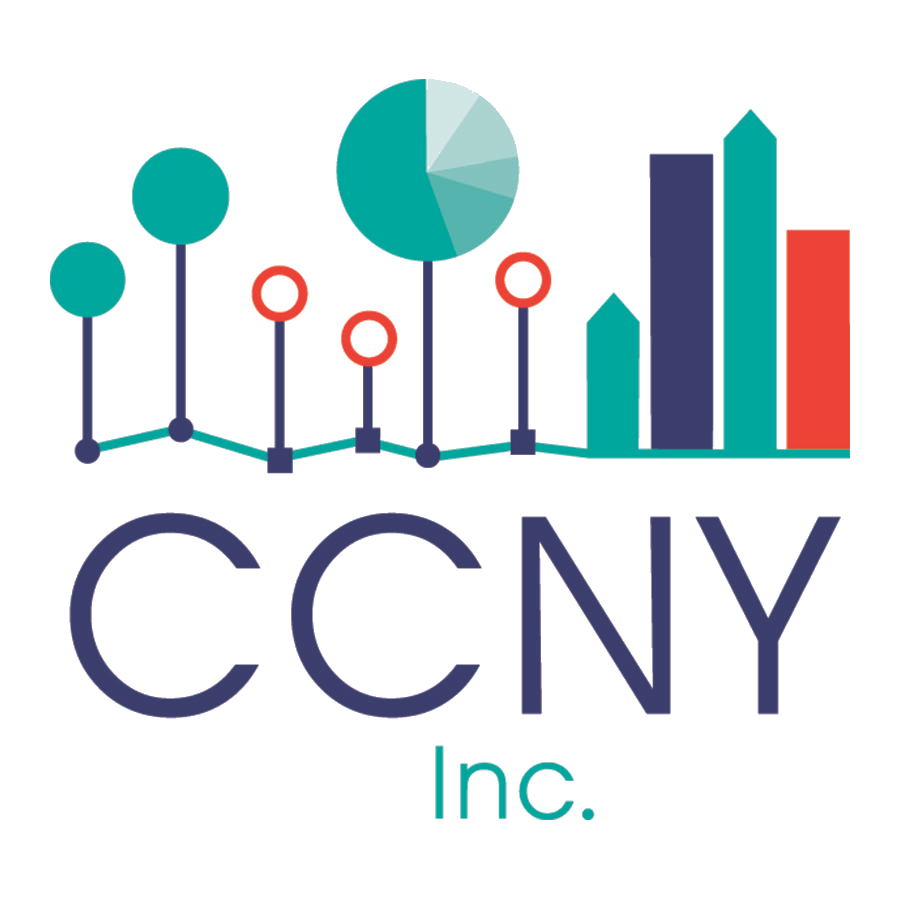
CCNY, Inc., a nonprofit organization based in Buffalo, New York, provides a comprehensive spectrum of services that range from program evaluation and data analytics to quality improvement and training. A recognized leader in the industry when it comes to improving service delivery in human services, they help organizations understand how to achieve their mission and drive positive change. Their expertise supports organizations in their goal to become data-driven organizations focused on increasing their capacity with utilization focused tools to improve positive outcomes.
“Building a stronger, more collaborative social service network means it is more critical than ever to foster connections and strategic partnerships across our sector,” commented Jody Levison-Johnson, president and CEO of Social Current. “As our Platinum Strategic Industry Partner, CCNY, Inc., brings a strong expertise on how organizations can better fulfill their mission while still achieving their bottom line. We are pleased to welcome them as Social Current’s first platinum partner for 2024.”
“The shared commitment to service excellence through continuous quality improvement is a focus that CCNY shares with Social Current and all its network organizations,” said Heidi Milch, Executive Director of CCNY. “When it comes to data-driven quality improvement this group is past the question of should we, and on to the question of how will we, which makes the Platinum Partnership the perfect avenue for CCNY to support network organizations with the tools that create capacity for lasting success.”
Social Current offers Platinum, Gold, and Silver Strategic Industry Partnerships that can help organizations foster and nurture connections and relationships across the social sector with a goal of enhancing our collective success and nationwide impact. Through Social Current’s partnership program, partners reach our network through annual meetings, networking events, discussion forums, learning series, thought leadership development opportunities, and more. For more information on Strategic Industry Partner opportunities, please contact Marisa Collins, director of strategic partnerships and partner communications.
About CCNY, Inc.
There’s always a human side to analytics, and that’s where CCNY comes in. With consultative services that encompass data collection, evaluation, analytics, predictive modeling, and quality improvement; it’s our job to facilitate data-driven decision making for those who work in health and human services. CCNY takes a utilization focused approach that ensures the work we do actually gets used.
Social Current is seeking competitive submissions for its 2024 Innovative Impact Award. Too often great ideas are kept in-house without recognizing their potential to create change beyond the communities where they were born. Social Current’s Innovative Impact Award identifies, documents, and celebrates examples of successful approaches to management and service delivery practices adopted by our network organizations.
The Innovative Impact Award will spotlight the efforts of Social Current network organizations—their staff, board, volunteers, and partners—who innovate for good to create lasting change with families and communities.
We invite you to share your successful strategies and serve as a resource for community-based organizations, leaders, researchers, and advocates across the full spectrum of human and social services.
Submissions should be focused within one of the following impact areas:
- Brain Science and Trauma Informed Approaches
- Child, Family, and Community Well-Being
- COA Accreditation
- EDI, Belonging, and Justice
- Government Affairs and Advocacy
- Leadership and Organizational Development
Applications should be submitted online by March 25. Submissions must include a synopsis of your innovative practice and a case study narrative that addresses the evaluation criteria. View the Innovative Impact Award program details, including submission guidelines, evaluation criteria, and eligibility.
Winner Benefits
The 2024 Innovative Impact Award winner will receive national visibility and promotion from both Social Current and participating national associations. The winner will also receive the following benefits:
- Showcase on Social Current’s website, newsletter, and social media platforms
- A virtual interview promoting your strategy
- Special award promotion toolkit including image assets, quotes, and sample language to develop your communications and use on your website
- Award plaque
- An opportunity to present a 90-minute workshop Social Current’s SPARK 2024 conference in Denver, Oct. 21-22
- Guest article on Social Current’s website
- Social Current swag bags for your team (up to 10 people)
View full award details and apply online by March 25. Contact Social Current with questions.
Social Current is now accepting presentation proposals for its SPARK 2024 conference, to be held Oct. 21-22 in Denver. This event will activate our collective power by sparking bold thinking and new conversations around some of our sector’s most vexing challenges. SPARK 2024 will offer a forum to connect, learn, refuel, and be inspired.
The deadline to submit presentations is Jan. 29, 2024.
Social Current’s mission is to advocate for and implement equitable solutions through collaboration, innovation, federal public policy, and practice excellence. This conference will convene and unite a diverse community from across our network and sector to share their expertise and drive toward an equitable society where all people can thrive.
Proposal Guidelines and Deadlines
- All workshop proposals must be submitted through the online submission form by Jan. 29, 2024.
- All required information must be submitted for proposal consideration.
- Proposed content should be appropriate for the 90-minute sessions. Participants prefer interactive sessions with clear takeaways and tools, rather than exclusively lecture.
- A maximum of three presenters/panelists is recommended.
- Proposals for sessions intended to sell a product, consultant, or program will not be considered.
- Submitting a proposal does not guarantee acceptance. Individuals will be notified by April 19, 2024 if their presentations have been selected for the SPARK 2024 program.
- Presenters are not paid for their participation but will receive a $75 discount on the full conference registration rate.
Core Areas of Focus
Social Current welcomes presentations that will engage, challenge, educate, and inspire participants to act. While emphasis will be placed on the core areas below, we welcome submissions that address other current issues affecting and important to our sector.
Brain Science and Trauma-Informed Approaches
Sessions should address the integration of brain science-aligned, healing-centered, and trauma-informed knowledge, skills, and strategies into one or more pathways for change, including programs, organizational culture, and/or systems-change efforts. Consider topics such as how the application of brain science can prevent and mitigate toxic stress to support child, family, and community health and well-being. Suggested topics also include ways to integrate brain science and equity, diversity and inclusion practices to strengthen organizational health.
Child, Family, and Community Well-Being
Sessions should describe innovative strategies for nurturing child and family well-being within communities, including efforts to transform child welfare systems into 21st-century child and family well-being systems, which involves but is not limited to child protective services. Consider proactive, public health approaches that address the social determinants of health, separate neglect from abuse, prioritize equitable solutions to better support families, and shift power toward families and communities.
COA Accreditation
Sessions should discuss keys to achieving COA Accreditation and explore the immediate and ongoing benefits of accreditation on organizations, the workforce, and persons served. Consider topics such as the return on investment in COA Accreditation, the importance of using data and quality improvement processes to impact service delivery, how to engage your board and/or staff in the COA Accreditation process, ways to leverage your accreditation, and “best in class” examples of standard implementation.
Equity, Diversity, and Inclusion
Sessions should address how organizations can create just, fair, and inclusive organizational cultures and communities through policies and practices, organizational leadership, and programs and services. Consider inequities related to health, education, wealth, systems involvement, and the workplace, based on race, sexual orientation, age, gender, socio-economic status, and ability.
Government Affairs and Advocacy
Sessions should explore strategies to effect positive change locally, regionally, or nationally. We invite presentations that share insight on how to successfully influence policy, engage lawmakers, and mobilize grassroots efforts. These sessions will examine the intersection of public policy, community engagement, and social impact with the goal of creating a more just and equitable society.
Leadership and Organizational Development
Sessions should discuss leadership approaches, strategies, and frameworks for developing the next generation of social sector leaders so that they can address challenges and sustain success to achieve greater impact. Consider approaches that promote the skills needed to create and sustain equitable, inclusive, and trauma-informed organizational cultures.
Submit your proposal through the online submission form by Jan. 29, 2024.
Social Current has always emphasized that together, we can create a greater impact. By working across systems, community-based organizations can establish a web of services that maximize their strengths and address their needs to better serve their staff and communities.
At Social Current, we provide multiple pathways toward purposeful partnership. From Strategic Industry Partners to Network Champions to Corporations and Philanthropy, we bolster our network’s impact by sharing their business solutions and opportunities.
Our President and CEO Jody Levison-Johnson would like to introduce our Silver Strategic Industry Partners in this video. These five partners offer specialized products and services that benefit the sector:
Meet Social Current’s Silver Strategic Industry Partners
Brown & Brown Insurance: Long-time partner Brown & Brown Insurance is the preferred choice of over 1,300 health and human services organizations nationwide. They are dedicated to making a positive difference in the lives of their customers by helping to protect what they value most.
FlexAMS: FlexAMS offers a results-driven and cost-effective Electronic Health Record (EHR) solutions geared toward nonprofit health and human service organizations. They are committed to superior customer service and affordability, making them the top choice for many behavioral health and social services organizations.
Marsh McLennan Agency: Marsh McLennan Agency provides business insurance, employee health and benefits, retirement, and private client insurance solutions across North America. With inclusion and diversity at the heart of their shared enterprise, they work side by side across disciplines, businesses, and borders to solve their clients’ most complex problems.
Public Consulting Group: Public Consulting Group is a leading public sector management consulting firm that partners with health, education, and human services agencies. They offer a multidisciplinary approach to solve their clients’ challenges and favor long-term client relationships.
Triad: Triad is the leading provider of education, community, and career resources for our sector. They support the behavioral and mental health community, from student to practitioner, and offer discounted rates for our network.
Interested in partnering with Social Current? Contact Marisa Collins, director of strategic partnerships and partner communications, or visit our partnerships page online.
The National Council for Mental Wellbeing recently released a new vision paper for community-based provider organizations and states working to leverage the Certified Community Behavioral Health Clinic (CCBHC) model to expand access to high-quality care.
CCBHCs: A Vision for the Future of Community Behavioral Health Care outlines a national vision for excellence in community mental health and substance use care and describes how clinics can leverage their CCBHC status to transform the experience of accessing care.
“We must take steps today to improve the quality of health care that will strengthen communities, help people in need, and improve health outcomes – tomorrow is too late,” National Council for Mental Wellbeing president and CEO Chuck Ingoglia said. “The overwhelming need for mental health and substance use care demands that we embrace innovative ways of structuring, as well as delivering and paying for care. The CCBHC model represents the best solution to accomplish that goal.”
The new resource captures innovations and best practices being used by CCBHCs that improve health outcomes, facilitate access to care, and demonstrate the value of the model. For clinics, it provides ideas to help design programs and services, streamline operations to ensure same-day access and develop a workforce capable of meeting increased demand for services, promoting health equity and improving health care outcomes. For states, it includes recommendations to engage with CCBHCs to better inform policy solutions to reduce barriers to care and coordinate statewide efforts like implementing the 988 Suicide and Crisis Lifeline.
Operated and certified in 12 states, CCBHCs have seen widespread bipartisan support in the last decade. Just last year, the CCBHC demonstration program was expanded to add 10 new states every two years, starting in 2024. As the program expands and more states begin drafting their state certification processes many will require accreditation.
Through COA Accreditation, a service of Social Current, we can ensure CCBHCs meet that accreditation requirement and successfully implement and build upon SAMHSA’s 2023 CCBHC Certification Criteria.
Learn more about how COA Accreditation standards support best practices for CCBHCs by visiting our website or joining an upcoming webinar.
Visit the National Council’s website to download the vision paper.
